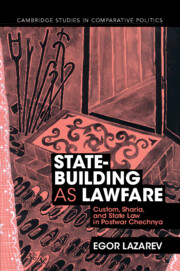Book contents
- State-Building as Lawfare
- Cambridge Studies in Comparative Politics
- State-Building as Lawfare
- Copyright page
- Dedication
- Contents
- Figures and Tables
- Acknowledgments
- Introduction
- Part I Theory and Ethnography
- Part II Lawfare and Political Order
- Part III Lawfare and Social Order
- 6 Laws in Conflict?
- 7 “People Need Law”
- 8 Chechen Women Go to Court
- Conclusion
- References
- Index
- Other Books in the Series (continued from page ii)
8 - Chechen Women Go to Court
War and Women’s Lawfare
from Part III - Lawfare and Social Order
Published online by Cambridge University Press: 02 February 2023
- State-Building as Lawfare
- Cambridge Studies in Comparative Politics
- State-Building as Lawfare
- Copyright page
- Dedication
- Contents
- Figures and Tables
- Acknowledgments
- Introduction
- Part I Theory and Ethnography
- Part II Lawfare and Political Order
- Part III Lawfare and Social Order
- 6 Laws in Conflict?
- 7 “People Need Law”
- 8 Chechen Women Go to Court
- Conclusion
- References
- Index
- Other Books in the Series (continued from page ii)
Summary
This chapter explores the legacies of the wartime disruption of gender hierarchies. It shows that after the Second War a sizable share of Chechen women began using the Russian state legal system, which formally acknowledges gender equality. The chapter suggests that the disruption of gender hierarchies can be attributed to several interrelated mechanisms. The most significant cultural change was that the conflict forced women to enter the public sphere. Women became representatives of their families and communities. At the same time, conflict gave rise to militarized masculinity and neo-traditionalism among Chechen men. This divergence was multiplied by changes in bargaining power within families due to transformations of gender positions in the labor market: many women became their families’ breadwinners. Furthermore, the effect of the disruption of gender hierarchies was exacerbated by the process of community disintegration, which diminished the ability of the extended family to apply pressure against women who used state courts. In addition, after the war, many of the NGOs refocused on gender problems and served as support structures for women’s legal mobilization. The last part of the chapter shows that women’s legal mobilization in Chechnya faced strong backlash from the Chechen regional government.
- Type
- Chapter
- Information
- State-Building as LawfareCustom, Sharia, and State Law in Postwar Chechnya, pp. 238 - 272Publisher: Cambridge University PressPrint publication year: 2023



